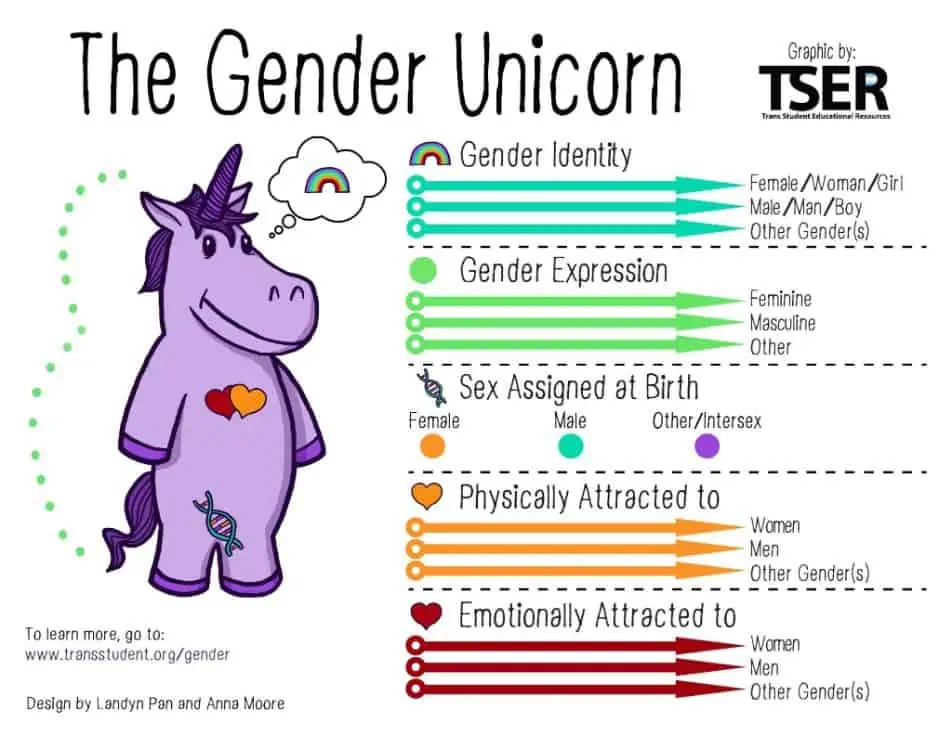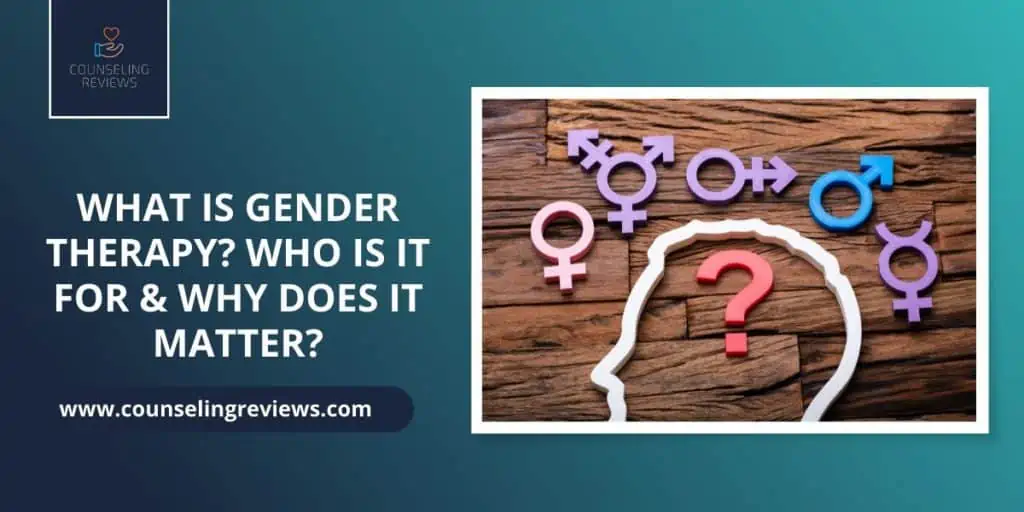It’s completely normal to question your gender, have some insecurities related to it, or just want to find out more about topics like these! That’s what gender conversation therapy is all about!
You can talk to a specialist from the field and they’ll explain all the things you could be wandering about. Some people have undergone traumatic experiences, others are just curious.
Whichever one it is, it all falls under gender counseling.
So What is Gender Therapy?
Gender therapy, also known as gender identity therapy, is a type of counseling aimed at supporting individuals who are exploring, questioning, or struggling with their gender identity. This form of therapy is particularly relevant for transgender, non-binary, and gender-nonconforming individuals, but it can be beneficial for anyone facing issues related to gender.
Who can Benefit from Gender Therapy?
The two main categories of people who look up gender therapy are either those who are curious about the topic or those who are going through emotional turmoil.
From here, an easy start would be to say that gender therapy is beneficial for people experiencing gender dysphoria. You could be considering transitioning, or maybe you’re in the middle of the process itself! For example, many people looking for more info on gender-affirming therapy (like hormone therapy) would do well to consult a professional!
Maybe you have already transitioned, and you feel like you want to discuss your experience with a therapist. It’s not always easy to adapt to such big changes! It takes time to feel comfortable in your new body and explore the new possibilities it offers!
But then, maybe you’re still just questioning your gender identity! You’re not sure if you identify as cis, trans, non-binary, or something else. You want to consult someone experienced and get some useful advice.
You can also go to gender therapy even if you identify as cis! It’s perfectly OK to be curious! Regardless of whether you are gay, straight, bi, or somewhere else on the LGBTQ+ spectrum, you won’t be out of place in the therapist’s office!
Some people – even cis, straight people – feel like they don’t fully conform to what’s expected of their gender. This, for instance, is one of the many questions a therapist can help you discuss.
It’s all about being open to possibilities and wanting to find out more! It’s also about helping you through tough transitions and any gender-related uncertainty!

Why Does it Matter?
- Affirmation and Validation: Gender therapy provides a supportive and affirming space where individuals can explore and express their gender identity without fear of judgment. This validation is crucial for mental health and well-being.
- Navigating Gender Transition: For those considering or undergoing gender transition, gender therapy can be a valuable resource. Therapists can assist individuals in exploring their options, understanding the implications of various choices, and providing emotional support throughout the process.
- Mental Health Support: Gender therapy addresses the mental health challenges that individuals may face due to societal stigma, discrimination, or internal struggles related to gender identity. Therapists can help clients develop coping strategies and resilience.
- Education and Advocacy: Gender therapists often play a role in educating clients about gender diversity, helping them navigate legal and medical aspects of transition, and advocating for the rights and well-being of gender-diverse individuals.
- Family Support: Gender therapy may involve family counseling to help parents and family members better understand and support their gender-diverse loved ones. This support is crucial for maintaining healthy family relationships.
How Long Does Gender Therapy Take?
It kind of makes sense that there’s no fixed length for gender therapy, right? Like, it’s relative and depends on each individual and their circumstances.
Some people, for example, only schedule a single meeting! Yes, that’s correct! They may have a single question that they want to be answered, so they book an appointment, attend the session, discuss their question, and leave!
These questions can be anything gender-related. One of the most common questions gender therapists get is: “Am I trans?” A therapist can’t tell you something like this. You’re the only one who can know, but still, they can help you on your way to getting there!
That’s why most therapies have many, many sessions – as many as a person needs. During them, you can discuss anything and everything. These are, after all, sensitive topics, and we all need time to process issues related to them.
So, how can you find the right person to talk to?

How Can You Find a Gender Therapist?
It can be quite difficult to find a proper transgender therapist. You’ll need someone who knows their way around various mental health issues, but also someone you’ll feel comfortable around.
It’s very normal to be unsure, so it’ll probably be important to do proper research before you start attending sessions with somebody. Good news! There are quite a few ways to find a therapist!
On paper, the most straightforward would be to talk to some of your other doctors. They’ve known you – and your body – for years, so you can feel free to ask them for a recommendation. If you feel comfortable, that is. It’s especially good if they are aware of your gender-related queries.
However, any other personal recommendation could work just as well. If you feel comfortable, talk to friends and family, and see if somebody you know has attended, or knows somebody else who has attended gender therapy. If they are happy with it, you can give it a shot!
But even if this doesn’t work, or doesn’t apply in your case, there are many alternative ways. Try looking up online therapist dictionaries, which are offered by several very good (and LGBTQ+ friendly) medical magazines.
You can also research on the internet, through social media, forums, therapist websites, clinical directories, etc. If you’re short on money, you may even find free online gender therapy!
We recommend exploring pridecounseling
Finally, any local LGBTQ+ organization might prove to be more than helpful. Unfortunately, many gender non-conforming young people have mental health problems due to societal pressures and imposed insecurities, so if anyone knows a good gender therapist, it’s likely someone who’s suffered the same problems as you.
Eventually, you’ll find a decent-looking therapist and book a meeting. But, how do you know they’re the right ones?
What Should You Look for in a Gender Therapist?
When it comes to sensitive issues such as gender, the therapist you consult must be open-minded, understanding, and tolerant. Also, it should be given that they’ve had the proper education needed to conduct gender therapy and that they’ve had a lot of experience with previous patients.
You’re completely within your rights to ask how and where they received their gender-related education. Have they had transgender, trans-affirming, or non-binary consultations before? What does their approach to these issues usually include?
They need to be up to date with topics such as LGBTQ+ rights, sexual orientation, and gender dysphoria, and they need to practice approved gender-affirming interventions. This is very important, as puberty blockers and hormone treatment are not something to play with if you don’t know what you’re doing.
Many gender non-conforming people also suffer from mental illness, so the gender therapist should be compassionate and aware of any such possibilities before saying something that could be hurtful or triggering.
If you’re uncertain about your gender, they should not try to force you to identify as either trans or cis! That’s not their job! Their job is to listen and offer support and advice.
Worst of all, they should never treat your gender-related insecurities as a mental illness. Never! If you notice any of these red flags, run ASAP!
Can a Therapist Diagnose Gender Dysphoria?
You may be a bit confused right now. If a therapist can’t tell you what to identify as then can’t they diagnose gender dysphoria? If they can’t, who can?
Gender therapists are the only people authorized to diagnose gender dysphoria. What they can’t do is assert their opinions and views before getting to know you and your troubles.
They should help you navigate your way through your questions and confusions, until you, yourself, come to realize how you feel.
Only at that point can they decide whether or not to diagnose you with gender dysphoria.
Gender Therapists by PrideCounseling
PrideCounseling.com is an online therapy platform that specializes in providing mental health services to the LGBTQ+ community, including gender therapy. Here are some key aspects of the gender therapy services offered by PrideCounseling: (Read our full review of PrideCounseling)
- Specialized Therapists: PrideCounseling.com employs therapists who have experience and specialization in dealing with gender identity issues. These therapists are knowledgeable about the unique challenges faced by transgender, non-binary, and gender-nonconforming individuals.
- Online Platform: The service is entirely online, which can be beneficial for those who prefer the convenience and privacy of receiving therapy from their own home. This can be especially important for individuals in areas where access to LGBTQ+-affirmative therapy is limited.
- Matching System: PrideCounseling.com uses a questionnaire to match clients with a therapist who best suits their needs and preferences. This can include considerations specific to gender identity and related concerns.
- Variety of Communication Methods: The platform offers various forms of communication, including messaging, live chat, phone calls, and video sessions. This flexibility allows clients to choose the mode of communication they are most comfortable with.
- Confidentiality and Privacy: PrideCounseling.com emphasizes client confidentiality and privacy, which is crucial for individuals who may not be openly exploring their gender identity.
- Subscription-Based Service: The service operates on a subscription model, which typically includes unlimited messaging and scheduled live sessions. This can be a cost-effective option compared to traditional per-session payment models.
- Accessibility: Since it’s an online service, PrideCounseling.com is accessible to individuals regardless of their geographical location, as long as they have internet access.
- Support Beyond Gender Issues: While specializing in gender therapy, therapists at PrideCounseling.com can also address other mental health issues such as depression, anxiety, stress, and relationship problems.
- Inclusivity: The platform aims to be inclusive and affirming of all identities within the LGBTQ+ spectrum.
- Feedback and Adaptability: Clients can provide feedback about their therapy experience, and if necessary, they can request to change therapists to find a better fit.
It’s important to note that while PrideCounseling.com offers specialized services for gender therapy, the effectiveness of therapy can vary based on individual preferences and the specific therapist-client match. As with any therapy service, it’s important for individuals to assess whether the service meets their personal needs and expectations.
Final Word
Regardless if you’re specifically looking for trans therapy, or are simply curious and exploring your possibilities, gender therapy is worth giving a try!
Putting aside the price of physical surgeries, which go above a few thousand dollars, and of hormone therapy doses, priced at about $30 per month, the cost of gender therapy should usually be around $100 per session. If that’s more than you can afford, you can always try free online gender therapy!
There are countless ways to get your questions answered!





